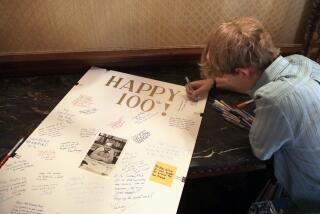Caltech Professor Wins Top Research Award
- Share via
A Caltech mathematician has won one of the scientific community’s most prestigious awards for his breakthrough work on wave signals, theoretical discoveries that could advance medical imaging, radar and other technologies.
Emmanuel Candes is this year’s recipient of the National Science Board’s Alan T. Waterman Award, the highest honor bestowed by the National Science Foundation.
It recognizes the achievements of scientists who are no older than 35, or not more than seven years beyond their doctorate. The prize includes a $500,000 research grant over three years.
“I’ve been floating above the ground,” Candes, 35, said Sunday. “I was overwhelmed.”
The French-born professor of applied and computational mathematics captured the award for developing more efficient methods for representing wave signals as digital data, and converting analog data into cleaner digital form. Those tasks have become crucial as more and more technologies shift from analog to digital.
Candes has come up with ways to translate analog signals into the ones and zeros of digital language with far fewer sensors.
In a news release, John Cozzens, a foundation program officer, described Candes’ work as “revolutionary.”
“It promises to take the field to a whole new level,” Cozzens said.
Candes’ mathematical tools eventually could enable radiologists to produce sharper MRI images in a much shorter time.
They also could be used to translate wide-band radiofrequency signals into digital information, expanding radar detection capabilities.
Down the road, Candes said, his theories potentially could be employed to make a range of everyday devices, such as digital cameras, simpler to design and more power-efficient.
He said the cameras now collect millions of measurements that are immediately discarded when a picture is compressed into a digital file.
“You’re making a lot of measurements, but you’re trashing most of them,” he said. “What we have discovered is a way of taking just the measurements that you need.”
Candes joined the Caltech faculty in 2000, two years after earning a doctorate in statistics at Stanford University, where he also played rugby. He did his undergraduate work in France.
He said a Stanford mentor, statistics professor David Donoho, inspired him to pursue the field of “harmonic analysis,” in which wave signals are separated and processed to allow scientists to glean more information from them.
Candes said the ultimate goal of his labors is to “make daily life easier.”
He said he was helped in his research by a group of graduate students and post-doctorate fellows, and UCLA mathematician Terence Tao.
Candes’ wife, Chiara Sabatti, is an assistant professor in human genetics and statistics at UCLA. They live with their two children in Westwood.
“I liked abstract thinking very early,” Candes said of his own childhood.







